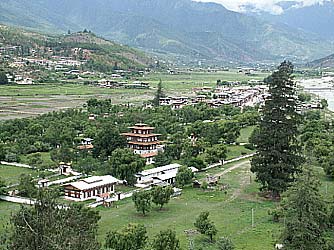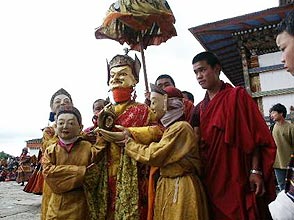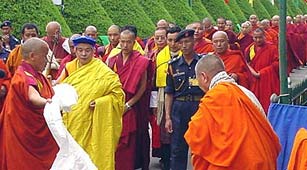 |
Bhutan's
Festivals |
|
 |
Bhutan's
Festivals |
|
|
 |
|
Thri
in Paro Festival in 2002
|
 |
Ugyen Pelri palace in Paro
His
Holiness the Je Khenpo, Trulku Jigme Chhoeda, is conducting a two-week
sacred Thri (admonition) ceremony at Ugyen Pelri palace in Paro.
The programme included a wang-lung (blessing and oral transmission)
ceremony and grouping of devotees into "families". The Thri, which
many Bhutanese aspires to receive once in a lifetime, has two literal meanings:
"to elucidate, elaborate, intsruct, or to explain", and the other is "to
lead or to bring along with". During the ceremony, the moral precepts and
the teachings of the Buddha are elucidated for the benefit of all devotees
to set them on the path to enlightenment or ultimate liberation. |
The
transmission of the Thri can be traced back to His Holiness Gampopa from
whom originated several Kagyu lineages. His Holiness Gampopa had upheld
the two aspects of Mahamudra (Chhagja Chhenpo): Mahamudra of Sutra (Do) and the Mahamudra of Mantra (Ngag). This lineage was transmitted
in the Drukpa Kagyue tradition through an unbroken line of masters
down to the present Je Khenpo who is transmitting it to more than 6,000
devotees in this ceremony.
The
devotees are guided in oral benediction or instructions on the preliminary
training. They perform prostrations, recitation of mantras, make offerings
and sing hymns in praise of the spiritual preceptor.
After
receiving the Thri the devotees are expected to abide by the fundamental
ethical injunctions taught to them to enable them to lead pure moral lives
and to carry out the preliminary practices for higher spiritual attainments.
The sole aim of such lives is to gain the ultimate liberation from the
cycle of existence and suffering in the Samsara (Khorwa). Eighty-year
old Sonam, who travelled all the way from Ngatshang in Mongar receiving
Thri from Je Khenpo was like Buddha's blessing and listening to the teachings
of Ugyen Guru Rinpoche. "I was fortunate to attend the sacred ceremony,"
said a devotee Aum Tshering Pem, 71, who walked three days from Gasa to
attend Thri. "Now I have no regrets even if I die".
|
His
Holiness the Je Khenpo united devotees from all walks of life into one
family as the seven Dorji Puens (spiritual brothers and sisters) who develop close relations and introduce them to their own families and
relatives. The devotees were grouped into Dorji Puens of seven with one
or two monks in each "family". The Dorji Puen is not just seven individuals
but they symbolise seven Buddhas. It is believed that the founder of
the Drukpa School, Dro Goen Tsangpa Jarey was meditating at the foot
of a tree when the seven Buddhas (Sangay Rabduen) revealed to him the sacred
teachings known as Tendrel Gi Choe (auspicious teachings of cause and
effect).
|
 |
It is after the seven Buddhas revealed to Tsangpa Jarey these sacred teachings that the system of Dorji Puens developed.
The
empowerment of the Thri ceremony is of paramount importance to those devotees
who wish to enter into the sacred path of Tantra. The lay devotees believe
that the empowerment helps to purify them from adventitious defilements,
alleviate their sicknesses, increase their life span, endow them with faith,
wisdom, and compassion, and set them on the path of higher spiritual attainments.
The
ceremony was organised on the request of the Rinpung rabdey, dzongkhag
administration, and the people of Paro, for the spiritual well being of
the people, the country, and all sentient beings.
 |
His
Holiness the Je Khenpo, Trulku Jigme Chhoeda, is conducting a two-week
sacred Thri (admonition) ceremony at Ugyen Pelri palace in Paro.
The programme included a wang-lung (blessing and oral transmission) ceremony and grouping of devotees into "families". The Thri, which many
Bhutanese aspires to receive once in a lifetime, has two literal meanings:
"to elucidate, elaborate, intsruct, or to explain", and the other is "to
lead or to bring along with".
|
During the ceremony, the moral precepts and
the teachings of the Buddha are elucidated for the benefit of all devotees
to set them on the path to enlightenment or ultimate liberation. The transmission
of the Thri can be traced back to His Holiness Gampopa from whom originated
several Kagyu lineages.
His
Holiness Gampopa had upheld the two aspects of Mahamudra (Chhagja Chhenpo): Mahamudra
of Sutra (Do) and the Mahamudra of Mantra (Ngag). This lineage was
transmitted in the Drukpa Kagyue tradition through an unbroken line of
masters down to the present Je Khenpo who is transmitting it to more than
6,000 devotees in this ceremony. The devotees are guided in oral benediction
or instructions on the preliminary training. They perform prostrations,
recitation of mantras, make offerings and sing hymns in praise of the spiritual
preceptor. After receiving the Thri the devotees are expected to abide
by the fundamental ethical injunctions taught to them to enable them to
lead pure moral lives and to carry out the preliminary practices for higher
spiritual attainments. The sole aim of such lives is to gain the ultimate
liberation from the cycle of existence and suffering in the Samsara
(Khorwa).
 |
| Contributed
by KUENSEL, Bhutan's National Newspaper |
| Information on Bhutan |
 |
|





